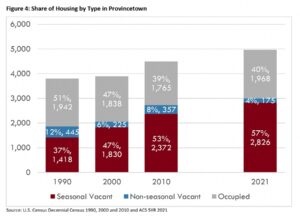PROVINCETOWN — A year after the select board first discussed the need for a study on potential short-term rental regulations, researchers at the UMass Donohue Institute turned in its 60-page assessment of what might and might not work here.

The study, presented to the select board on Sept. 25, was written by Rod Motamedi and five other researchers in the Institute’s economic and public policy research group. It outlined the short-term rental market in Provincetown and identified regulations tried in other towns across the country that could make sense here.
The report’s principal conclusion was that short-term rentals are a subset of a much larger vacation home market — a market that is large and still growing. The authors concluded that new short-term rental regulations likely would not change vacation homes back into year-round homes.
“The evidence gathered in this study suggests that any STR regulation is unlikely to reduce home prices or rents to a level affordable to residents or to induce owners of vacation homes to stop using the homes themselves and instead rent them out to local workers,” they wrote. The median condo price would need to fall by as much as 70 percent to become affordable, they noted.
That “70 percent” caught select board member Leslie Sandberg’s attention, and she asked Motamedi to repeat it.
Then he told the board something it already knew: Provincetown housing prices are similar to those in New York, Boston, and San Francisco. “The vacation home buyer is bringing income from those other places,” said Motamedi, “and you have that disconnect between the income of the residents and the income of the buyers.”
Only about a third of vacation home buyers are using short-term rentals to support their purchases, the study found. Capping the number of short-term rentals or devising a zoning map for them would likely just shift those properties into the hands of other vacation home buyers, the authors wrote.
The study did not suggest doing nothing, however.
Short-term rental regulations designed to limit corporate ownership of homes and ensure that homeowners are “connected to the community” could still be advisable, the authors wrote.
“Though current data suggests there are few properties used solely as STRs, Provincetown may still wish to restrict this use to encourage every homeowner to have a connection to the community, whether as a resident or a seasonal visitor,” the authors wrote. “That can be done through restricting the number of STR licenses available to any single owner or banning corporate ownership without an obvious natural person as the beneficial owner.”
Those measures are on the warrant for Provincetown’s Oct. 23 town meeting.
Article 11 would ban corporations from holding short-term rental certificates except for LLCs, trusts, and S corporations that have named their beneficial owners at town hall.
Article 12 would limit individuals to holding two certificates, although people who already have more than two would be “grandfathered in” and get to keep all their existing licenses.
Meanwhile, in Vail and Truckee
The researchers suggested copying a primary-residence deed restriction program used in Vail, Colo. That program permanently removes some units from the wider vacation home market and places them in a parallel market that is tied to local incomes.
The restrictions do not limit the resale price or rent that the owner may seek, the report said. But the occupancy requirement “effectively shrinks the market of buyers by tying the asking price to local wages,” the authors wrote, citing a study of Vail’s program from the U.S. Dept. of Housing and Urban Development. It is one way of insulating local buyers from competition with wealthier buyers and renters.
Vail has invested an average of $70,000 per unit to gain a total of 174 units this way. The program has cost $12.2 million over six years.
The study also suggested an incentive program to lead vacation homeowners to rent to seasonal or year-round workers. It might not interest many, but some might be convinced, especially if they do not plan to use their properties much in the short term.
“It is possible that owners could cycle in and out of programs as their needs changed,” the report said. Homeowners might bring in long-term tenants one year when they don’t expect to travel to Provincetown much, then go back to having short-term renters again.
Naturally Occurring Affordability
The study also pointed to the existence of “naturally occurring affordable housing (NOAH).”

A relatively new term, NOAH “generally is understood to mean rental housing at least two decades old, short on amenities and affordable without a subsidy,” according to the Washington Post. Because these units are privately owned and were not built with taxpayer money, they have rarely been a focus of housing policy, even though they are far more numerous than subsidized units nationwide.
Such rentals had been the intended focus of short-term rental regulations, however, said select board chair Dave Abramson.
“When there were initial discussions of STR regulations last winter, I think people were trying to prevent something that was a rental from going to the short-term rental” column, Abramson said.
But whether regulations or incentives could slow the conversion of year-round rentals to vacation homes was not discussed in the study.
“I think it is important for us to protect our affordable and community housing stock against changes in the market going forward,” said select board member Austin Miller. He called for “a robust and diverse set of deed-restricted units throughout the town.” He suggested deed restrictions for both year-round rental and seasonal workforce housing.
“I want to encourage everybody who’s been listening today to take some time to dig into this Donohue study,” select board member Erik Borg said. “Regardless of whether you’re disappointed with what it’s saying or whether it’s exactly what you wanted to hear, I think there’s an opportunity to dig into it, to think about follow-up questions, to try to poke holes in it to see what comes up. Hopefully it’s a starting point to find what’s right for Provincetown.”
